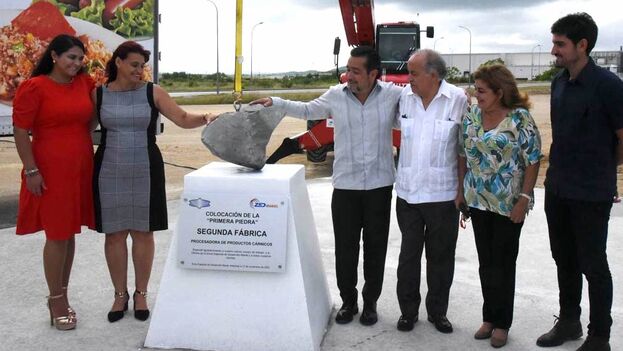
![]() 14ymedio, Havana, 19 November 2022 — On Thursday, the directors of the meat company Richmeat de Cuba, S.A., which operates with Mexican capital, laid the cornerstone of its new factory in the Mariel Special Development Zone, with an opening expected in 2027. This is an extension of its facilities, which have been using Cuban labor and totally foreign investment since 2015.
14ymedio, Havana, 19 November 2022 — On Thursday, the directors of the meat company Richmeat de Cuba, S.A., which operates with Mexican capital, laid the cornerstone of its new factory in the Mariel Special Development Zone, with an opening expected in 2027. This is an extension of its facilities, which have been using Cuban labor and totally foreign investment since 2015.
Cuba’s Minister of Foreign Trade, Rodrigo Malmierca, had discreetly announced the expansion of Richmeat on November 9 on State TV’s Roundtable program, with the promise that Cuba would do everything possible to pay its debts to investors “gradually.”
The ceremony in Mariel was held in the presence of the Ambassador of Mexico on the Island, Miguel Díaz Reynoso, Déborah Rivas, Deputy Minister of Foreign Trade and Foreign Investment, and Carlos Luis Jorge Méndez, General Director of Foreign Investment of that ministry.
The official newspaper Granma explains that the previous Richmeat plant, also built in Mariel, was at “its highest level of production,” with a capacity for 3,000 tons per month of picadillo [mixed ground meat].
Like other Cuban and mixed-capital companies, Richmeat sought business opportunities at the Havana International Fair (FIHAV). Luis Alberto González Hernández, President of the company, said that the new plant will be used for the manufacture of sausages, with a brand they called “La Favorita,” on which “market tests” have been performed.
The factory is expected to operate beginning in 2027, with a production capacity of 7,000 tons of sausages per month, made with the “newest technologies” and the promise of “high quality standards in their processes.”
The plant will have a workforce of 400 and will be a “continuation” of the existing one, dedicated to the seasoned picadillo. The most sensitive issue — and the one that seems to least concern current investors — is that of raw materials. González Hernández said that a part will be “of national origin,” but did not detail where Richmeat would obtain the meat to fill the supply deficit that has already been announced.
Asked by Granma about this issue, he limited himself to answering cryptically that there were “agreements” to “encourage suppliers,” and that they will be able to “grow together with the firm and increase all productions.”
The distribution of the product is another tricky situation. But the director assured that Richmeat was protected by “contracts with the chain stores of the national network,” although he avoided specifying whether Cubans would pay for the product in pesos or in freely convertible currency (MLC). Logistics, on the other hand, will be resolved by the company’s own transport network.
Without taking into account that Richmeat works with Mexican money — a country that will surely also have to send part of the raw material — González Hernández said that his company’s initiative “decreases imports.”
“Our goal was clear, very clear, to produce the largest amount possible for the tables of Cuban families,” said the manager, also ignoring the general scarcity on the Island.
The article, paraphrased by Cubadebate, was harshly criticized by readers, who noted that “from the beginning, nothing of nothing has been available” in the markets in pesos and expressed their concern about the origin of the raw materials.
“All slaughterhouses and sausage production have stopped,” said one user, while another explained that Richmeat products will only reach the west and will be insufficient for the whole country.
Some complained that only Richmeat and its partners in the Cuban government could be interested in opening a plant from scratch, when there are meat factories on the Island that are paralyzed, waiting for maintenance, or malfunctioning.
In Sancti Spíritus, for example, the sausage production plant — the only one at the moment in the country — had a meat deficit in the province. The low production added to the shortage of raw materials, caused an increase in the price of meat, and the sausages were not intended for family consumption but for hotels and the network of stores in MLC.
During 2021, pork production in Cuba fell by 53.5% compared to the previous year, with just 132,900 tons. This streak of bad luck also affected beef, with a decrease of 13.5%, lamb by 32.5% and poultry by 20.8%, according to the National Office of Statistics and Information (ONEI). For its part, in 2022 the Government predicted a total production of 26,000 tons of pork, according to the figures released by Cuban Television in April, a tiny amount compared to the 200,000 tons that were forecast in 2017.
Translated by Regina Anavy
____________
COLLABORATE WITH OUR WORK: The 14ymedio team is committed to practicing serious journalism that reflects Cuba’s reality in all its depth. Thank you for joining us on this long journey. We invite you to continue supporting us by becoming a member of 14ymedio now. Together we can continue transforming journalism in Cuba.
